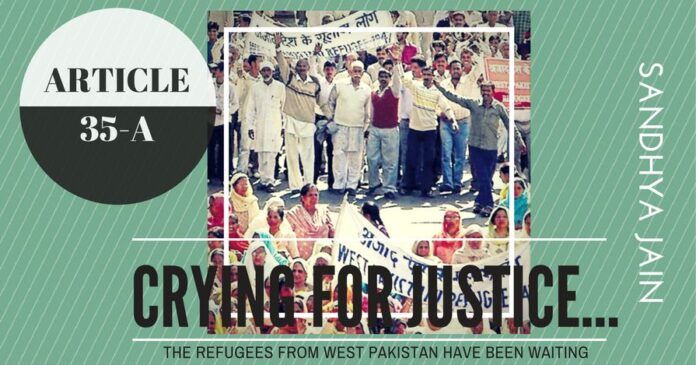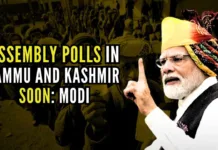
In a decision with far-reaching potential for the continuation of Article 35A, the Supreme Court on Monday, 4 September 2017, agreed to hear the descendants of refugees who migrated from West Pakistan after 1947. The petitioners, who had migrated to Jammu and Kashmir after the Partition, are demanding the striking down of Article 35A of the Constitution that allows the state to make special laws for its “permanent residents”.
A three-judge bench headed by Chief Justice of India, Dipak Misra, has permitted the petition of Labha Ram Gandhi s/o Ram Pal Sharma r/o Village Chadwal, Kathua, Jammu, to be clubbed with other pending petitions challenging Article 35A. The main petition concerns equal rights of inheritance by women who marry outside the State.
Unlike refugees who trooped into Punjab, Rajasthan, Delhi, or Tripura and West Bengal in the east, refugees who landed in Jammu and Kashmir were not allowed to merge into the society and did not get equal rights as citizens of free India. Thus, even after seven decades of freedom, nearly three lakh refugees live in slums without basic amenities such drinking water, sewage or other facilities. They are denied permanent residency status and cannot buy property, vote in state and municipal elections, secure government employment or enjoy any of the benefits available to permanent residents of Jammu & Kashmir. Admission to State educational institutions is simply impossible.
The petitioners assert that they are Indian citizens, who are designated as “West Pakistan Refugees” on grounds that following partition, the petitioners and persons of their class migrated to India from the now called “Pakistan” (formerly West Pakistan).
In Writ Petition (Civil) No. 871 of 2015, the West Pakistani Refugees Action Committee filed an additional affidavit under Order IX of Supreme Court Rules, 2013, seeking justice under Article 32 of the Constitution of India.
Petitioner Labha Ram Gandhi, representing the group, asserts that the petitioners are Indian citizens, who are designated as “West Pakistan Refugees” on grounds that following partition, the petitioners and persons of their class migrated to India from the now called “Pakistan” (formerly West Pakistan).
According to the 183rd report of the department-related Parliamentary Standing Committee of Home Affairs, titled “Problem being faced by Refugees and Displaced Persons in J&K”, tabled in Parliament on 22 December 2014, around 5,764 families consisting of 47,215 persons migrated from West Pakistan and settled in different areas of Jammu, Kathua and Rajouri districts of Jammu Division.
The State Government did not allot any land to the West Pakistan refugees. However, as per the Report, the migrated families occupied 45,466 kanals of land (State land 10,478 kanals, Evacuee land including other types of land 25,976 kanals and other land 10,012 kanals) which was allowed to be retained by them without conferring upon them the title of land because of their non-permanent resident status of the State.
The parliamentary committee report further states that the lands up to 12 acres of Khushki (un-irrigated) or 8 acres of Aibi Land (irrigated), subject to certain conditions, had been allowed to be retained by West Pakistan Refugees and as a result, 46,466 kanals of State/EP land stands retained by WPRs under Cabinet Order No. 578-C of 1954.
A mass exodus of population from Pakistan-occupied area of Jammu and Kashmir (PoJK) followed Pakistani aggression in Jammu and Kashmir in 1947. The data of the Ministry of Home Affairs shows that 31,619 families were registered with the Rehabilitation Organisation, out of which 26,319 families opted to settle down within the State itself and 5,300 families settled outside the State of J&K.
The Cabinet Order No. 578-C of 1954 granted various financial and other assistance to PoJK Refugees only, and under Allotment of Land Rules of 1954 and Agrarian Reforms Act, occupancy rights of Pak Occupied J&K Refugees were made heritable as well.
However, no such occupancy rights in the land possessed by West Pakistan Refugees was conferred upon the West Pakistan Refugees under any law in force in the State of Jammu and Kashmir. (It seems reasonable to deduce, given the way things have unraveled in J & K since 1947, that faith could be the reason behind the discrimination; the West Pakistan Refugees are all Hindu).
The petitioners lament that the West Pakistan Refugees who were allowed to occupy the land measuring around 45,466 kanals have been allowed to reside on such lands. Despite having been in occupation of such land since 1947, the West Pakistan Refugees have not been granted any occupancy right or any other right in the property under any state legislation.
The Cabinet Order No. 578-C of 1954 grants any right in such lands by virtue of the occupancy of such land by West Pakistan Refugees. but the State Government did not execute any Ijazatnama in writing at the relevant time (1947) and after 10 years (1957), the Rayatnama could not be issued because of statutory or constitutional prohibition under Section 6 of the Constitution of J & K.
The President of India, exercising power under clause 1(d) of Article 370 of the Constitution of India, issued the Constitution (Application to Jammu & Kashmir) Order 1954 enforced with effect from 14 May 1954 whereby, inter-alia, Part III was made applicable to Jammu and Kashmir, subject to the modifications and exceptions as stated in the said Constitutional Order 1954. The Constitution Order 1954 added and inserted a new Article, “Article 35-A” after Article 35, in relation to the State of Jammu and Kashmir.
Article 35-A, which deals with laws regarding permanent residents and their rights, states that: –
“Notwithstanding anything contained in this Constitution, no existing law in force in the State of Jammu and Kashmir and no law hereafter enacted, by the Legislature of the State, (a) Defining the classes of persons who are, or shall be, permanent residents of the State of Jammu and Kashmir; or (b) Conferring on such permanent residents any special rights and privileges or imposing upon other persons any restrictions as respects (i) Employment under the State Government; (ii) Acquisition of immovable property in the State; (iii) Settlement of immovable property in the State; (iv) Right to scholarships and such other forms of aid as the State Government may provide shall be void on the ground that it is inconsistent with or takes away or abridges any rights conferred on the other Citizens of India by any provisions of this part.”
The petitioners point out that “immediately before the issue of the Constitution (Application to Jammu and Kashmir) Order, 1954 on 14 May 1954, there was no term such as “Permanent Resident” existing in any of the State Statutes enforced in Jammu and Kashmir. In fact, the term ‘state subject’ was in vogue in the State of J&K and the term “State Subject” was used to be referred to citizens of a particular country under monarchy.
It is pertinent that the order of Maharaja Hari Singh issued under his Private Secretary’s Circular Order No. ps-2354 dated January 31, 1927, defined the “Hereditary State Subjects” and merely had laid down the condition that “in future in case of every new entrant into the State service, the authority empowered to make the appointment should certify that he has satisfied himself after due enquiries that the person appointed is a hereditary State Subject”.
The Ruler vide Notification No. 1-L of 1984 dated 20 April, 1927 further defined “the State Subjects”. Four classes of State Subjects were defined and accorded preference to persons of one class over other classes in the matter of grant of State scholarships, State lands for agricultural and house building purposes, and recruitment to State service.
Another Notification was issued by order of His Highness the Maharaja Bahadur on 27 June 1932, (14th Har, 1989, published in Government Gazette dated 24th Har, 1989) whereby “the foreign nationals residing in the State of Jammu and Kashmir shall not acquire the nationality of the Jammu and Kashmir State until after the age of 18 on purchasing immovable property under permission of an ijazatnama and on obtaining a rayatnama after ten years continuous residence in the Jammu and Kashmir State as laid down in Notification No.-l-L. of 1984, dated 20th April, 1927”.
A perusal of the said notifications shows that so far as the issues of the right of children to be considered eligible in the matter of admission in educational institutions are concerned, the Notifications are silent.
It can be discerned that the above-mentioned Notifications of the Ruler clearly permit acquisition of immovable property under an ijazatnama and obtaining a rayatnama after 10 years, both being an executive function of the State. The status of state subjects could be granted to any person who is not a state subject or his descendent.
On 6 April 1955 (24th Chet, Svt. 2011), in order to create a class namely “Permanent Resident” and to provide privileges and benefits, so as to create a law as if it was in force prior to the commencement of the Constitution (Application to Jammu and Kashmir) Order, 1954, the Constituent Assembly amended the Constitution of J&K 1939 by the Jammu and Kashmir Constitution (Amendment) Act 2011 (Svt), whereby Sections 5A, 5B, 5C, 5D, 5E and 5E were incorporated in the Constitution of J&K 1939 with retrospective effect i.e. 14 May 1954.
Section 5A, 5B, 5C, 5D, 5E and 5F read:
“5-A. Every person who is or is deemed to be a citizen of India under the provisions of Part-II of the constitution of India as applied to the State of J&K under the Constitution (Application to Jammu & Kashmir) Order, 1954 shall be permanent resident of the State of Jammu & Kashmir if it at the date of Commencement of the Jammu & Kashmir Constitution (Amendment) Act, 2001, namely, the 14th May, 1954, (a) he was a State subject of class -II as defined in the State Subject Notification No. 1-L/1184 dated 20th April, 1927, read with notification No. 13/L dated 27th June, 1932; or (b) after having acquired immovable property in the J&K State in pursuance of an Ijazatnama granted under the Ijazatnama Rules for the time being in force, he has been ordinarily resident in the territory of the State for not less than ten years prior to the date of such commencement.
Explanation :- All persons who before the commencement of the Constitution (Application to Jammu & Kashmir) order 1954, were State subjects of Class-I or Class-II as defined in the State subject Notification No. 1-L/84 dated 20th April, 1927, read with Notification No. 13/L dated 27th June 1932, and who having migrated after the first day of March, 1947, to the territory now included in Pakistan, returns to the State under a permit for resettlement in the State or permanent return issued by or under the authority of any law made by the State Legislature shall continue to be deemed permanent residents of the State.
5-B. Notwithstanding anything contained in the foregoing provisions of this Act, every company which, immediately before the commencement of the Constitution (Application to Jammu & Kashmir) Order 1954, was recognized to be State Subject within the meaning of State Subject Notification No. 1-L/84 dated 20th April, 1927 shall be deemed to be a permanent resident at such commencement.
Explanation: In this section ‘Company’ shall have the meaning assigned to it in the Jammu & Kashmir Companies Act, 1927.
5-C: Every person, who is or who is deemed to be a permanent resident of the State of Jammu & Kashmir, shall subject to the provision of any law that may be made by the State Legislature, continue to be such permanent resident.
5-D: The power of the State Legislature to define the term ‘permanent resident’ of the State and to regulate their special rights and privileges shall be exercisable only by a majority of not less than two- thirds of the total membership of the Legislative Assembly.
5-E: Nothing contained in the foregoing provisions shall derogate from the power of the State Legislature to make such Laws as it thinks fit with respect to the acquisition of the status of the permanent resident and until the State Legislature enacts provisions in that behalf the existing Izajatnama Rules shall continue to remain in force and the existing procedure for obtaining a State Subject certificate shall be followed for the purpose of securing the certificate of being a permanent resident of the State.
5-F: Unless the context otherwise requires, all reference in the existing laws of the State to the expression ‘State Subject’ shall be construed as reference to the permanent residents of the State.”
The petitioners contend that a perusal of Section 5-E clearly demonstrates that the grant of status of “Permanent Resident” continued to be the executive function of the State Government till the State Legislature resorted to the procedure under Section 5-D. Hence, Section 5A, 5B, 5C, 5D, 5E and 5F cannot be said to have constitutionally existed in the Constitution of J&K 1939 in order to determine the law existing on the date of commencement of the Constitution Order 1954 as applied in respect of the State of Jammu and Kashmir.
Further, the Jammu and Kashmir Civil Servants (Removal of Doubts and Declaration of Rights) Act 1956 (“the Act 1956”) was enacted to remove certain doubts and difficulties regarding the civil servants of the state and to declare their status, rights and obligations. Under Section 3 of this statute, the State Government is empowered to frame rules for recruitment and appointment to public services and posts in connection with the affairs of the State.
Section 3 of “the Act 1956” reads:
S.3 Recruitment and Conditions of Service of persons serving the State: (1) The Government may make rules regulating the recruitment and conditions of service of persons appointed to public services and posts in connection with the affairs of the state. (2) Until other provision is made in this behalf under this Act, all rules, regulations, orders and notifications in force immediately before the commencement of this Act and applicable to any public service or any post which continues to exist after the commencement of this Act as service or post under the State shall continue in force so far as consistent with the provision of this Act.
On 14 June 1956, the State Government framed and notified rules namely “Jammu and Kashmir Civil Services (Classification, Control and Appeal) Rules 1956” (“the Rules 1956”). The Rules 1956 inter alia define the qualification for recruitment in the Services and the relevant Clause (a) of Rule 17 which is impugned in the present Writ Petition reads:
Qualifications – No person shall be eligible for appointment to any service by direct recruitment, unless – (a) he is a hereditary State Subject to be known hereafter as a permanent resident; (b) …. Not relevant here to be cited.
However, the Regulations of 35 B of Jammu and Kashmir Civil Services Regulations, permit the West Pakistan Refugees to apply for the lowest rung of the cadre of class IV employee and for this purpose exemptions have been granted from submitting the Permanent Resident Certificate.
On 17 November 1956, the State Constituent Assembly of Jammu & Kashmir adopted the Constitution of Jammu & Kashmir. It consciously made a radical departure from the scheme of Section 5D and 5E of the Constitution of J&K 1939 and the powers vested in the political executive under Section 5E of Constitution of J&K 1939, to allow a person (other than state subject of class I, II and III) to purchase land under Ijazatnama Rules and thereby obtain the status of state subject of class III. This was done away with in the new Constitution of JK 1957.
Thus, the State Subjects of the Ruler classified as class I, II and Class III state subjects was frozen for the said category now termed as “permanent resident” as defined under impugned Section 6 of the Constitution of J&K and such status is heritable by their descendants only. Thus, the status has become the status by heredity (descent), and the class of citizens of India holding such status has been conferred with fundamental rights having absolute primacy over the fundamental rights of the other citizens of the country.
Regarding the right to acquire immovable property, the petitioners contend that “The Constitution (44th Amendment) Act 1978” has not been extended by the President to the State of J&K, hence the Citizens of India who are factually permanent residents of the State including the petitioners, have been guaranteed the fundamental right to acquire and hold immovable property in the State of J&K.
But by virtue of the impugned Article 35-A, the petitioners have been completely denied the right to acquire and hold immovable property, right to do business by purchasing immovable property or right to acquire a limited property to reside and settle in the State. The classification in Article 35-A and Section 6 of the State Constitution has led to complete prohibition against the West Pakistan Refugees seeking admission in the State’s technical institutions.
Thus, the width of the provisions of Article 35-A taking away the fundamental rights of the Petitioners and their class guaranteed under Article 14, 15, 16, 19(1)(f), 19(1)(e), 19(1)(g) and 21 of the Constitution of India, is such that is not permissible to be provided by the President under Article 370 of the Constitution to India.
Section 6 has been extended to create a class of permanent resident so as to deny “the right to vote on the basis of Adult Suffrage”. The President while applying Part XV to the State, effaced and omitted Article 325 and 326 to apply to the state of J&K; but the State Constituent Assembly had no competence or mandate to establish a system of governance in the State which is fundamentally different from the system of governance in States in the rest of the country and enact Section 6 so as to exclude other citizens residing in the State from participating in the election of State Legislature on the basis of adult suffrage which forms the core value of the basic structure, i.e. democracy. Thus, citizens of the country have been denied the right to vote on the basis of classification infringing Article 14 as well.
The contentious Article 35A was inserted in Appendix II of the Constitution of India by Presidential Order of 1954, without being presented, much less approved, by the Indian Parliament.
The contentious Article 35A was inserted in Appendix II of the Constitution of India by Presidential Order of 1954, without being presented, much less approved, by the Indian Parliament. Critics of Article 370 argue that this obnoxious provision, which has fuelled separatism in the Kashmir valley, can also be removed by Presidential Order, provided there is political will.
The Supreme Court will hear arguments in the Article 35A case after Diwali this year. It is hoped that the noxious clause will be struck down and, when the issue of State Minorities is resolved by the apex Court, the long-suffering refugees from West Pakistan will be recognised as a State Minority and given their due.
- Plagiarism with Pride - November 10, 2018
- “Hindu-ness is the essence of India” – RSS Sarsanghachalak - September 20, 2018
- Lacunas persist in Kathua story - May 5, 2018











You have clearly not understood that the discriminated persons are Hindu refugees. Also, minority status will help them – and other minorities in the State – to get the Constitutional benefits bestowed by the Indian constitution, which are currently given to the Muslim majority.
This has been challenged in the Supreme Court of India, which has questioned why this gross injustice is going on. You seem unaware of this . These benefits are paid by Indian tax payer.
Why is Ms Jain advocating Dhmimi- hood for Dharmic people.- Jains, Hindus, Buddhists, etc
Solution is to get rid of Islamics who have forcefully taken over Jammu, Kashmir, Ladhakh, not seek to be their Dhimmis.